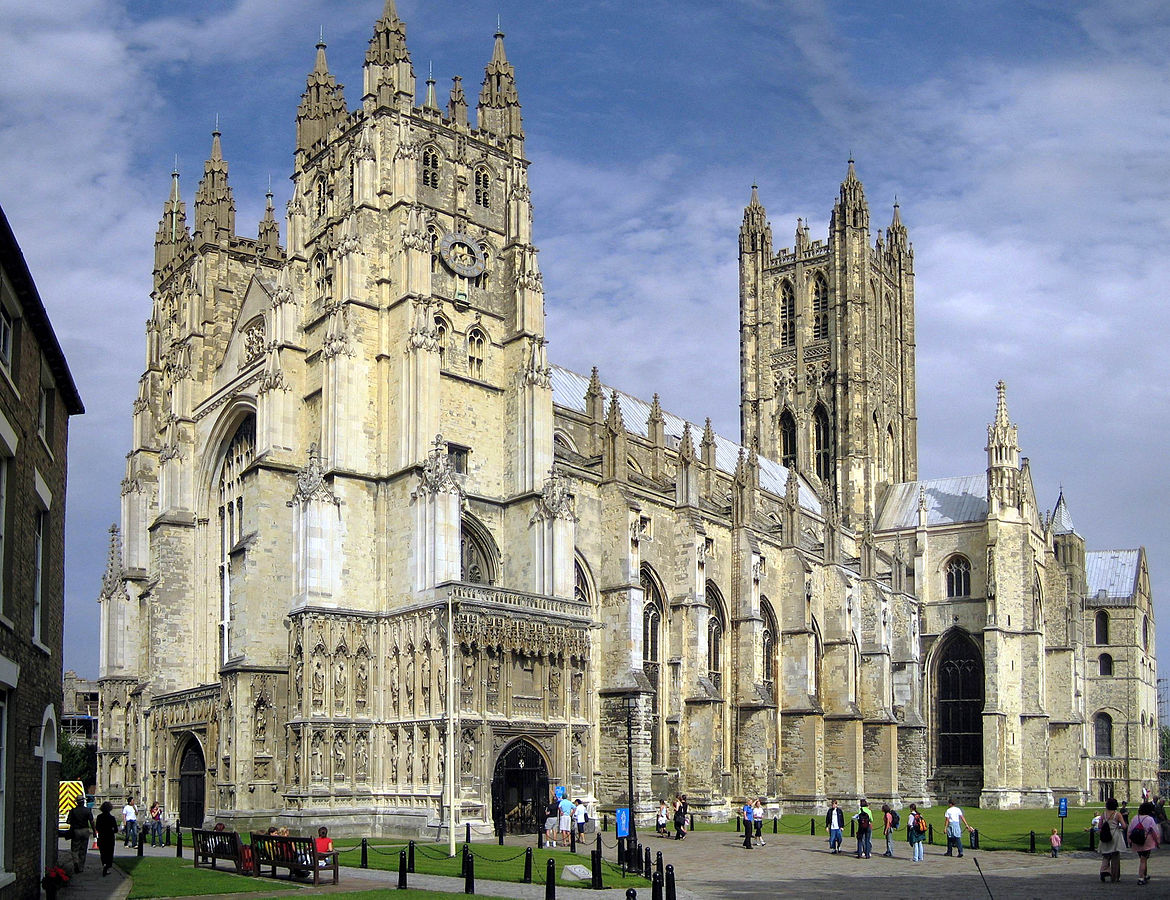TWH – In the “West,” the number of people reporting that they are Christian is declining. No other religious culture is replacing the Christian one. Research suggests that ex- and post-Christians are abandoning religious culture.
They are the “Nones,” the religiously unaffiliated. This major cultural shift has opened up a pluralistic space. In that space, the Pagan revival has occurred. Two new reports discuss this trend in the United Kingdom and in Canada. Both reports are based on surveys.

Canterbury Cathedral [Photo Credit: Hans Musil CC BY-SA 4.0]
The decline of Christian culture in the UK
The National Centre for Social Research published a report, “British Social Attitudes 36.” In 2018, only 36% of respondents claim to be Christian. In 1983, 66% did. In 2008, 50% of the population did. For thirty years, each successive generation has fewer people claiming Christian religious culture.
The report failed to mention Druidic, Heathen, Pagan, or Wiccan beliefs, cultures, identities, or practices. The report did mention one study of broadly defined New Age practices in a small English town. In that town only 2% of the population engaged in practices like Yoga and meditation.
People abandoning all religious culture have driven this change. In 1983, 31% of respondents claimed no religious culture. By 2018, that number had grown to 52% of respondents. The “Nones” are now a majority in the UK. In 1998, about 11% of the respondents grew up without any religious culture. They were second generation “nones.” By 2018, that number had almost doubled to 23%.
Immigration has driven a slight increase in non-European religious identify. The number of respondents claiming Muslim culture has increased from 1% in 1983 to 6% in 2018.
One Christian religious culture has had a sharper decline than others. The Anglican Church has been losing members for years and in significant numbers. In 1983, about 40% of respondents claimed Anglican religious culture. In 2018, only 12% did so.
Anglican identity appears closely linked with age. About 33% of those 75 and older identify as Anglican. Among those aged 18 to 24, only 1% identified as Anglican.
Parallel to the decline in Anglican culture, non-denomination Christian culture has grown in the last thirty years. In 1983, about 3% of respondents claimed a non-denomination Christian culture. In 2018, that number had grown to 13% and the proportions of people claiming to be non-denominational Christians 13%, was slightly larger than the proportion claiming to be Anglican, 12%. In contrast, the proportion of Roman Catholic respondents declined only slightly, ranging from 10% in 1986 to 7% in 2018.

Via della Conciliazione to St. Peter’s Basilica in Rome. [Photo Credit : S. Ciotti]
Attendance at weekly religious services has remained relatively constant at about 11%. The report failed to specify whether that weekly service was Christian. Thirty years ago, weekly attendance would likely have been almost entirely Christian. Today, some of that attendance may well include other major faiths such as Islam and Hinduism.
The decline in Christian culture correlates with the other trend in British society: the rise of secularism. That trend has resulted in more British people favoring scientific explanations over religious ones, including teachings on gender roles, and sexuality.
This decline in Christian culture occurs along with a general decline in trust in institutions. Only 46% have some degree of confidence in religious institutions. About 21% have no confidence in them. In 2018, 63% felt that religion brought more conflict than peace. About 13% disagreed. Between 1987 and 2018, strong identification with political parties declined from 44% to 35%. Christian culture in general, and Anglican culture in particular, is declining rapidly in Britain, at an almost dizzying rate.
The decline of Christian culture in Canada
The Pew Research Center also released a report, “5 facts about religion in Canada.” Canada still has a small Christian majority.
Only 55% of Canadian respondents said they were Christian, of whom 29% reported as Catholic, 18% as Protestant with 8% other Christians. The number of respondents without a religious culture, the “Nones” has increased to 29%.
Canadian Protestants showed a steeper decline than Canadian Catholics. Protestant respondents declined from 41% in 1971 to 27% in 2011. Proportion of Canadian Catholics only declined from 47% in 1971 to 39% in 2011. In contrast the proportion of the “Nones” was in 4% in 1971. By 2011, that proportion had risen to 29%.
Canadian provinces differed in their rates of decline. The decline was greater in the Western and Pacific provinces. The Eastern and Atlantic provinces showed much less decline. Largely Catholic Quebec had declined the least. About 67% of Canadians accept the idea that one can be a good and moral person without a belief in the Abrahamic god.
The decline of Christian culture in the “West” remains an important trend. It demonstrates the changes in culture away from a single dominant religious tradition. The declining numbers may also fuel social reactions, including, for example, a rise in Christian fundamentalism or fears about becoming a minority faith to another dominant “foreign” one such as Islam.
The rise in religious pluralism and secularism will likely result result in more tensions about values and morality. One issue that is certainly unclear is when and whether Pagan and Pagan-adjacent faiths will be counted.
The Wild Hunt is not responsible for links to external content.
To join a conversation on this post:
Visit our The Wild Hunt subreddit! Point your favorite browser to https://www.reddit.com/r/The_Wild_Hunt_News/, then click “JOIN”. Make sure to click the bell, too, to be notified of new articles posted to our subreddit.